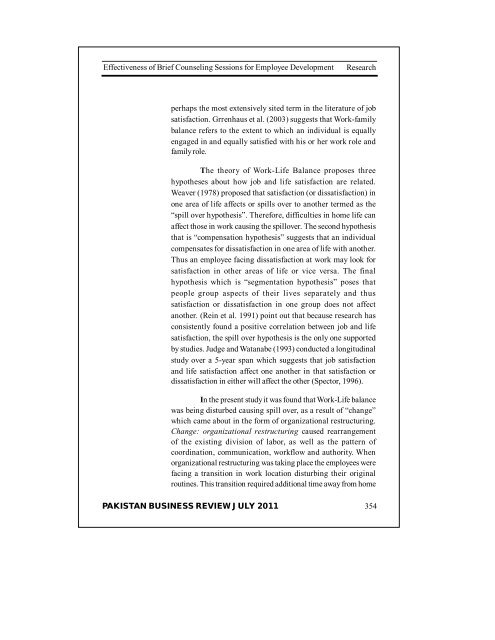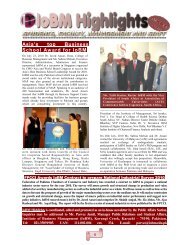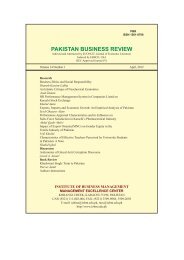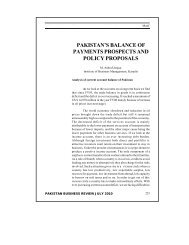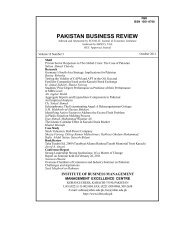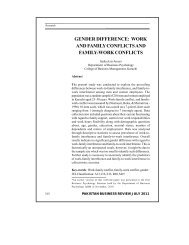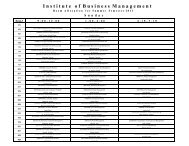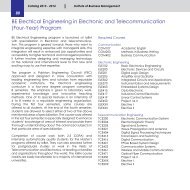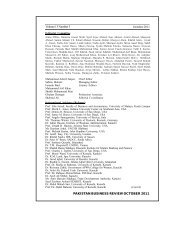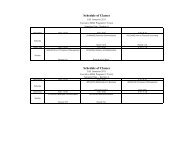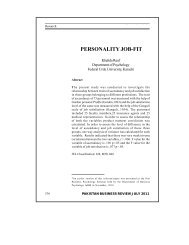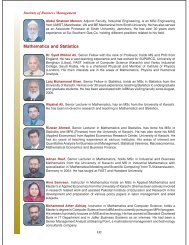PAKISTAN BUSINESS REVIEW - Institute of Business Management
PAKISTAN BUSINESS REVIEW - Institute of Business Management
PAKISTAN BUSINESS REVIEW - Institute of Business Management
Create successful ePaper yourself
Turn your PDF publications into a flip-book with our unique Google optimized e-Paper software.
Effectiveness <strong>of</strong> Brief Counseling Sessions for Employee Development<br />
Research<br />
perhaps the most extensively sited term in the literature <strong>of</strong> job<br />
satisfaction. Grrenhaus et al. (2003) suggests that Work-family<br />
balance refers to the extent to which an individual is equally<br />
engaged in and equally satisfied with his or her work role and<br />
family role.<br />
The theory <strong>of</strong> Work-Life Balance proposes three<br />
hypotheses about how job and life satisfaction are related.<br />
Weaver (1978) proposed that satisfaction (or dissatisfaction) in<br />
one area <strong>of</strong> life affects or spills over to another termed as the<br />
“spill over hypothesis”. Therefore, difficulties in home life can<br />
affect those in work causing the spillover. The second hypothesis<br />
that is “compensation hypothesis” suggests that an individual<br />
compensates for dissatisfaction in one area <strong>of</strong> life with another.<br />
Thus an employee facing dissatisfaction at work may look for<br />
satisfaction in other areas <strong>of</strong> life or vice versa. The final<br />
hypothesis which is “segmentation hypothesis” poses that<br />
people group aspects <strong>of</strong> their lives separately and thus<br />
satisfaction or dissatisfaction in one group does not affect<br />
another. (Rein et al. 1991) point out that because research has<br />
consistently found a positive correlation between job and life<br />
satisfaction, the spill over hypothesis is the only one supported<br />
by studies. Judge and Watanabe (1993) conducted a longitudinal<br />
study over a 5-year span which suggests that job satisfaction<br />
and life satisfaction affect one another in that satisfaction or<br />
dissatisfaction in either will affect the other (Spector, 1996).<br />
In the present study it was found that Work-Life balance<br />
was being disturbed causing spill over, as a result <strong>of</strong> “change”<br />
which came about in the form <strong>of</strong> organizational restructuring.<br />
Change: organizational restructuring caused rearrangement<br />
<strong>of</strong> the existing division <strong>of</strong> labor, as well as the pattern <strong>of</strong><br />
coordination, communication, workflow and authority. When<br />
organizational restructuring was taking place the employees were<br />
facing a transition in work location disturbing their original<br />
routines. This transition required additional time away from home<br />
<strong>PAKISTAN</strong> <strong>BUSINESS</strong> <strong>REVIEW</strong> JULY 2011<br />
354


